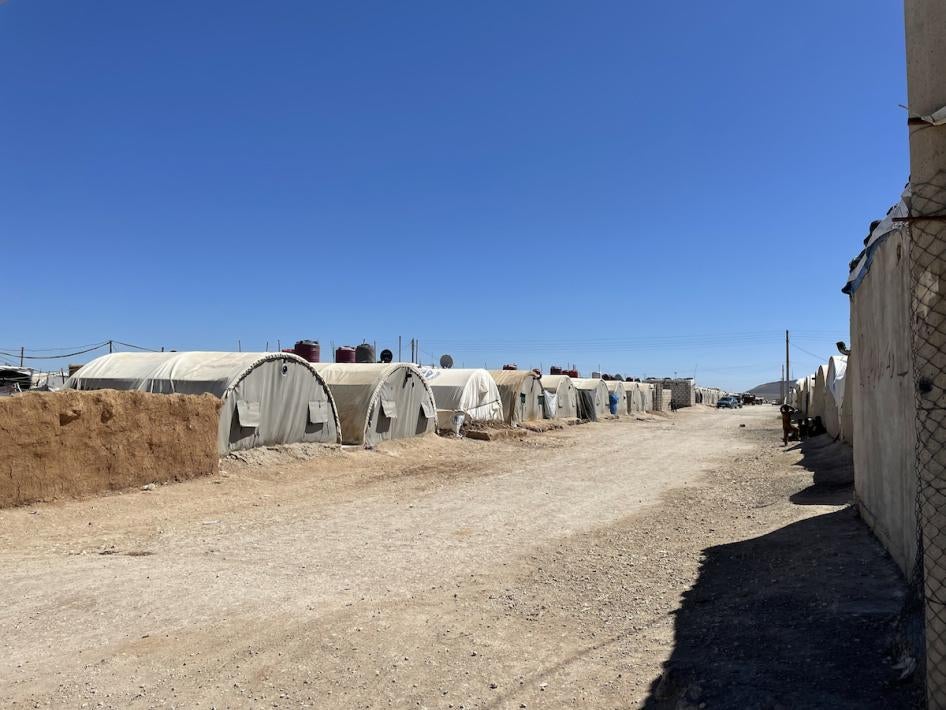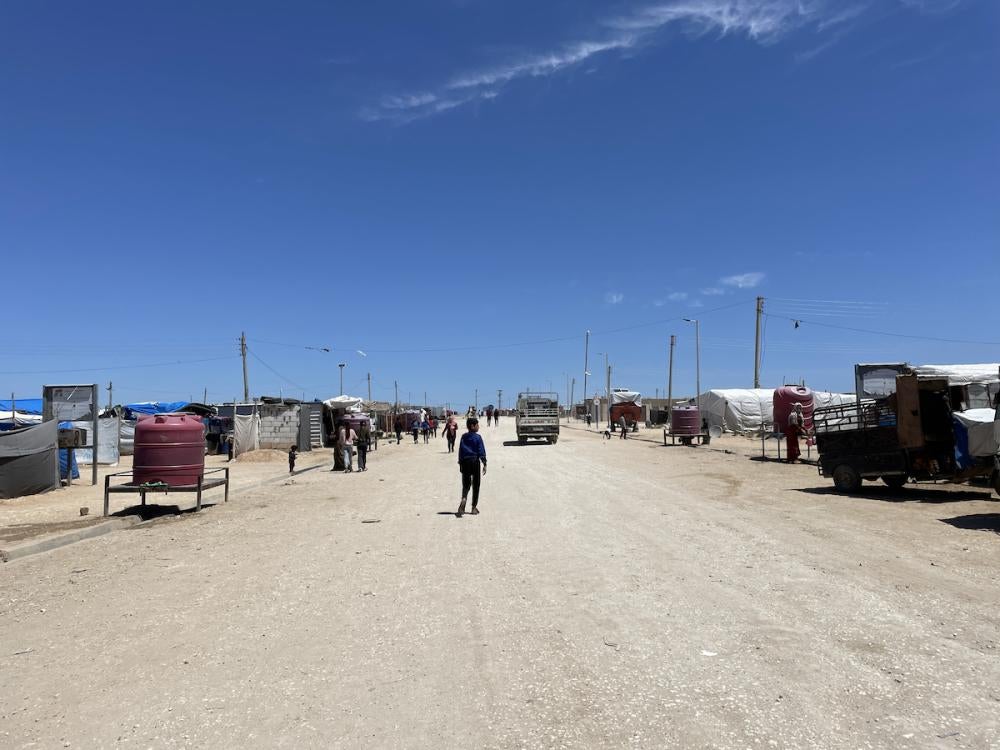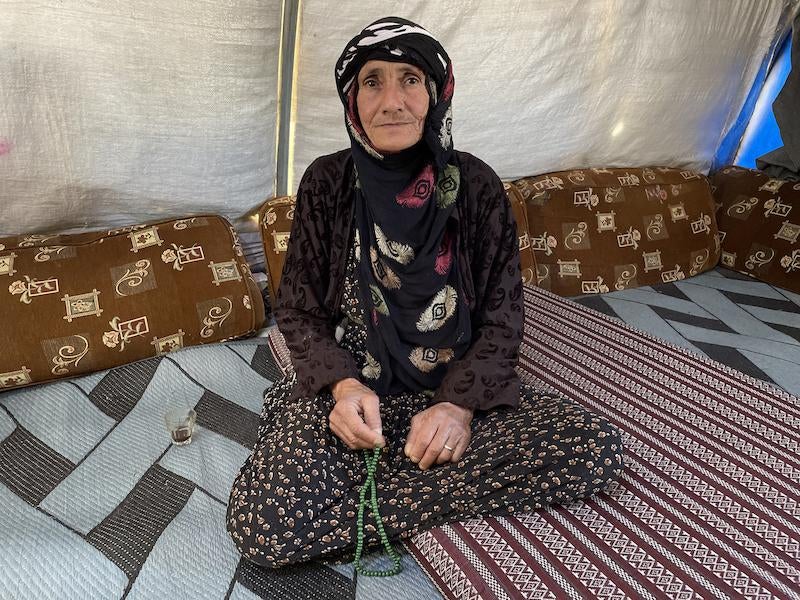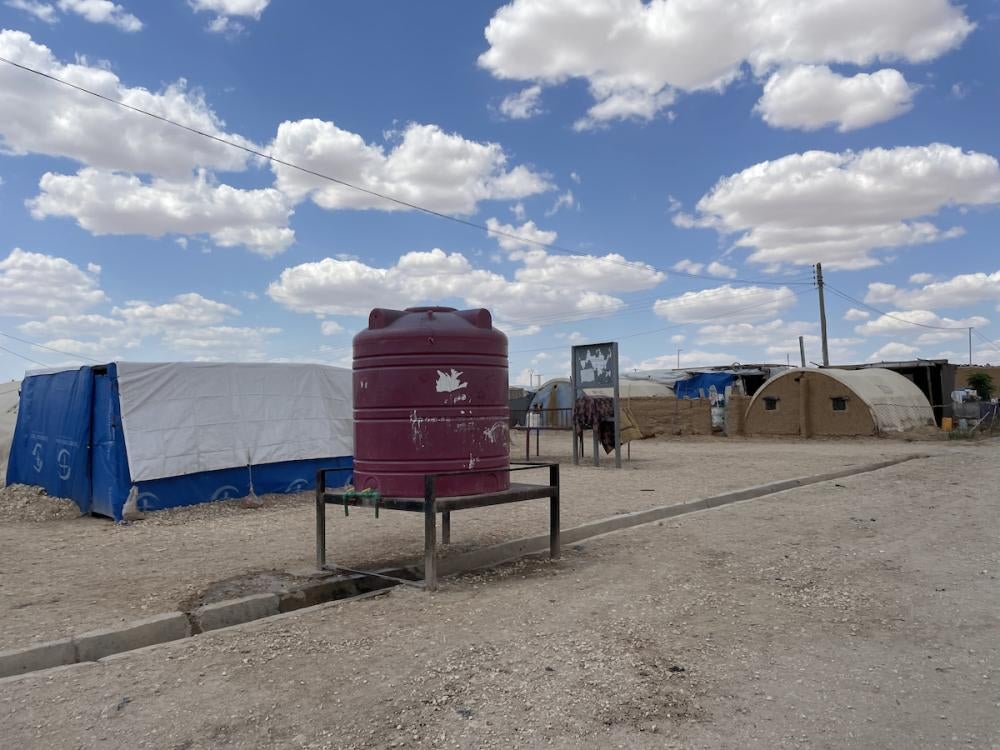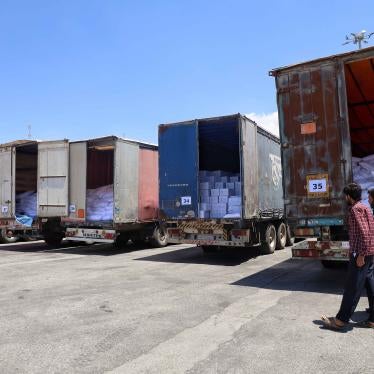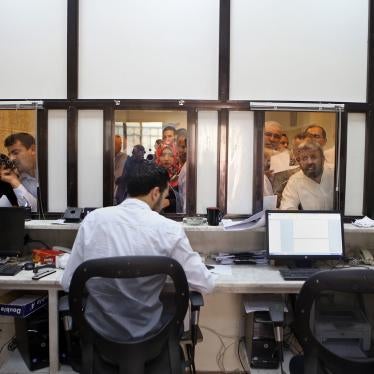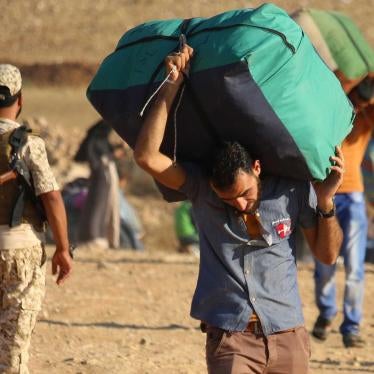(Beirut) – Tens of thousands of internally displaced people in overstretched camps and shelters in northeast Syria are not receiving sustained or adequate aid, thereby negatively impacting their basic rights, Human Rights Watch said today. There is an urgent need for weather-appropriate shelter, sufficient sanitation, and adequate access to food, clean drinking water, health care, and education.
The assistance provided by United Nations agencies to camps and shelters in territories governed by the Kurdish-led Autonomous Administration of North and East Syria is inconsistent, leaving some camps and shelters, especially the “informal” ones, without sufficient or sustained aid. Although international nongovernmental organizations provide limited assistance, multiple gaps have led to health and hygiene breakdowns and shortages in essential materials during extremely hot and cold weather, raising concerns as to whether the current level of aid ensures the economic and social rights of the displaced people and meets the universal minimum standards for humanitarian assistance.
“Almost four years have passed since hundreds of thousands of people arrived in Kurdish-controlled northeast Syria seeking shelter and support after Turkey’s invasion of their hometowns,” said Adam Coogle, deputy Middle East director at Human Rights Watch. “But the lack of adequate help has created a precarious situation.”
The UN, other aid agencies, and the autonomous administration should urgently turn their attention to the precarious humanitarian situation unfolding in informal camps and collective shelters by prioritizing a rights-based approach, Human Rights Watch said.
The underserved camps are at capacity and forced to turn newly displaced Syrians away. Three of the informal camps were established following Turkey’s 2019 military incursion into the region that drove hundreds of thousands of people from their homes, and displacement continues, especially from villages on the frontlines between territory controlled by the autonomous administration and territory occupied by Turkey due to ongoing hostilities. The use of schools as shelters has disrupted education for the host and displaced populations alike.
The Syrian government has been weaponizing aid for years, seeking to dictate where the aid flows, and has co-opted and obstructed it from crossing front lines from government-held parts of the country. Even though UN-led aid operations are a lifeline to millions of civilians in northern Syria, in January 2020, Russia forced the Security Council to shut down three of four previously authorized border crossings, entirely cutting off UN-led cross-border aid for the northeast, leaving UN agencies at the mercy of often arbitrary and unjustified government-imposed conditions.
In May, a Human Rights Watch team visited al-Hasakeh governorate in northeast Syria and met with 18 displaced people as well as local administrators in Washokani and Serekaniye camps. Researchers also visited three schools in al-Hasakeh city used as temporary shelters and met with host communities, local officials, humanitarian workers, Syrian human rights activists, and local organizations.
Al-Hasakeh governorate went from a population of under half a million to two million after Turkey’s 2019 invasion of northeast Syria and the ensuing mass exodus from the now Turkish-occupied areas, according to local officials. This puts a particular strain on local authorities particularly since al-Hasakeh city and surrounding areas are experiencing an acute water crisis.
On June 22, 2023, Human Rights Watch wrote to relevant UN agencies seeking information about their activities in the area but received no response as of August 16. Human Rights Watch had received, separately, responses from the UN Office for the Coordination of Humanitarian Affairs with respect to questions on the ongoing water crisis.
Aid workers said the region has 12 camps, 5 of which, including Washokani and Serekaniye, largely do not receive sustained service delivery by UN agencies but rely on the autonomous administration and international groups for some services. Camp administrators said that until January, the UN classified these camps as “informal” – that is, not established by humanitarian organizations. Two other camps in Manbij, also described as “informal,” had no presence of local officials, did not receive any UN support, and very little support from international groups, aid workers said. Some “informal” camps receive food baskets, intermittently, from the World Food Programme. Five other camps – al-Hol, Roj, Areesha, Nowruz, and Mahmoudli – were considered “formal” and received sustained services although they, too, were affected by disruptions.
Humanitarian workers said that as of January, the UN no longer categorized the camps in northeast Syria as formal and informal. It is unclear how that has translated on the ground, since “informal” camps were still without sustained UN aid.
Another 95 shelters host displaced people across northeast Syria, the majority in school buildings. They also do not receive sustained UN support and only get meager aid from nongovernmental groups and charities.
Both camp administrators and aid workers said that UN agencies needed Syrian government approval to access and provide aid to these camps and shelters.
Barzan Abdullah, a co-administrator at Washokani camp, northwest of Hasakeh city, said the local Kurdish authorities established the camp on December 24, 2019, after the Turkish occupation of northeast Syria, and since then displaced people have kept arriving from occupied areas and villages on the front lines affected by ongoing Turkish shelling.
As of August 1, the camp housed 16,657 residents – 2,262 families, of whom 90 to 95 percent were Arabs from Ras al-Ain (Serekaniye) and surrounding villages. He said about 400 families lacked their own tents and had to share or find accommodation elsewhere. A severe shortage of cleaning materials contributed to the outbreak of cholera and camp residents contracting scabies and other skin diseases, he added.
A Washokani camp resident, 43, father of six school-age children, said he and his family had nowhere else to go: “The structures here are bad. If only they [camp administration] would provide a tarpaulin to protect us from the heat and cold. My sector in the camp has 500 people, and we all have to use just one toilet [facility].”
Despite regular testing of water quality, poor sanitation and hygiene at Washokani camp resulted in 25 cases of measles, smallpox, and Leishmaniasis – a disease caused by parasites – in April alone, according to humanitarian agencies. Cholera has also been reported, and people also suffered from kidney malfunctions and gallstones due to the over-chlorination of water, they said.
On August 1, 2020, local authorities established Serekaniye camp, near al-Hasakeh city. As of August 1, the camp hosted 15,570 people – 2,580 families – in 3,989 tents. The UN did not formally recognize the camp until January, they said.
Salwa, camp co-administrator, said the situation at the camp has steadily deteriorated due to a lack of tents and insufficient cleaning materials and hygiene kits from aid groups. She said food parcels distributed by aid groups no longer contained cooking oil or as much rice and bulghur as previously, and due to wheat shortages, loaves of bread were smaller.
Camp administrators also said several tents had caught fire during the winter due to the poor quality of furnaces used by the families, and that parts of the camp had been flooded during the winter.
An aid group that trucks water into the camp said it tests water quality daily, but the camp still has water-borne diseases, including cholera. Although some groups provided some medical care, camp administrators said there are no specialists or pediatricians, and the camp only had one ambulance.
According to local officials, 40 schools in al-Hasakeh were unusable for education, at least 28 of which were still being used as shelters. Humanitarian workers told Human Rights Watch that displaced populations in collective shelters are at risk of eviction as local authorities aim to return these sites to their original purpose as education facilities. The Syrian Democratic Forces, the armed wing of the autonomous administration, uses other schools as prisons, at least two schools, in Amuda and Ein Issa, are being used by Russian forces.
One of the schools in al-Hasakeh is used by 32 internally displaced families from Turkish-occupied Ras al-Ain. Some extended families are housed together in one room. One shelter resident, a father of three, said lack of support and opportunities affected his children: “In this same room, we have to eat, sleep, and use the toilet. Other than a bread bundle from one international organization, only the Syrian Red Crescent provides some rice, sugar, and oil, but only every two months.”
Parties to the conflict using schools in northeast Syria as military bases or as prisons should vacate the schools and provide alternative options for education in the meantime, Human Rights Watch said.
The Syrian government and other conflict parties should urgently remove any impediment to aid delivery to areas not under their control in northeast Syria, and the autonomous administration should scale up support where possible to communities that do not receive sustained UN support.
UN agencies should speak out on the need for the protection of economic and social rights, including the rights to health, food, and water of everyone in the “informal” camps and shelters, conduct an assessment to ensure that the universal minimum standards for humanitarian response in these sites are being met, and expand service delivery to include the people living there. If a lack of approvals from the Syrian authorities is preventing consistent access to these previously “informal” camps, collective centers, and informal settlements, the UN resident coordinator should prioritize negotiating access with Syrian authorities and coordinate their response more effectively with local humanitarian actors.
International donors should increase funding to respond to the protracted nature of displacement in northeast Syria.
“Given ongoing displacement, the dire and overlooked conditions in northeast Syria's camps and shelters are a stark reminder of the urgent need for concerted humanitarian efforts to ensure the well-being and dignity of all displaced people,” Coogle said.
